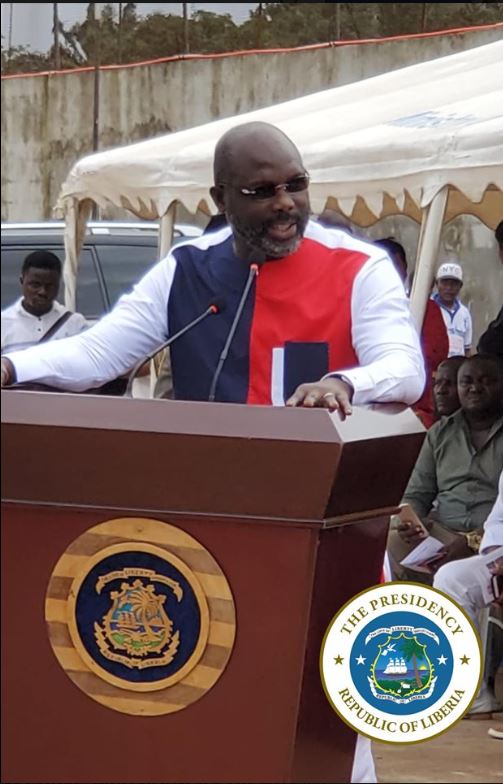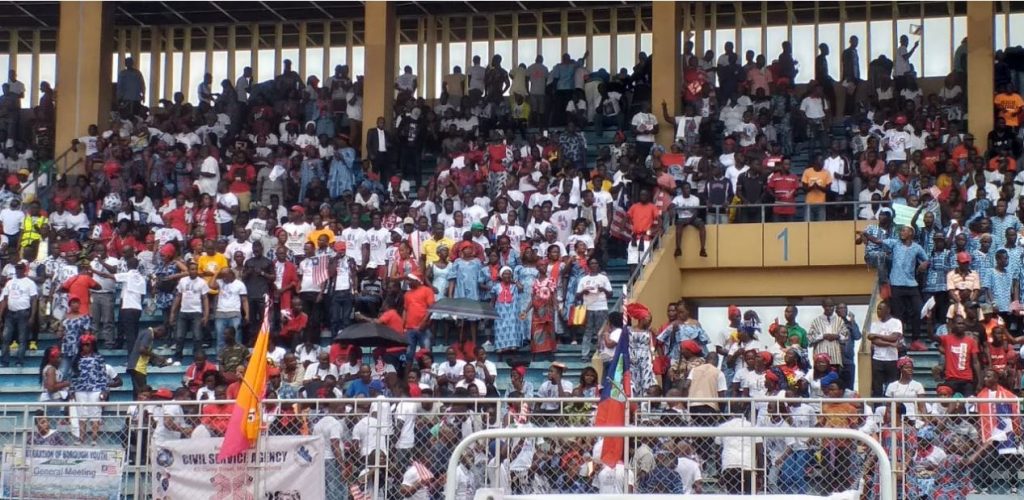
Liberia, on Friday, July 26, celebrated 172 years as an independent, sovereign nation. The colorful celebrations were held at the Samuel Kanyon Doe Sports Complex in Paynesville, outside Monrovia.

The event was graced by dignitaries and six Heads of State. President Julius Maada Bio of Sierra Leone, President Mahammadu Buhari of the Federal Republic of Nigeria, President Alassane Ouattara of la Côte d’Ivoire, President Alpha Conde of Guinea, President Roch Marc Christian Kaboré of Burnika Faso, and President Macky Sall of Senegal, were all official guests of President George Weah for the occasion.
Earlier at the Barclay Training Center, a military barracks in Monrovia, troupes hoisted the national flag and this was followed by a grand parade through the streets of Monrovia.
Prior to the main celebrations on Independence Day, several projects were inaugurated. The government projects include the new ministerial complex in Congo Town built with Chinese assistance to house some of the ministries of government and the new terminals at the Roberts International Airport in Margibi County. The private projects dedicated include the Sethi Brothers Steel Production Plant in Gardnersville, Monrovia – the first of its kind in Liberia – and the Shangyou Rubber Wood Processing Factory in Todee District, Montserrado County.

Brief Independence History
A young African American man from Virginia, USA, named Joseph Jenkins Roberts declared the colony of Liberia in West Africa an independent republic on July 26, 1847. The following year he became the first elected president of the new country. Roberts had moved there in 1829 at the age of 20 from Petersburg, Virginia.
The Liberian Declaration of Independence was adopted by the Liberian Constitutional Convention on July 26, 1847, to announce that the Commonwealth of Liberia, a colony founded and controlled by the private American Colonization Society, was an independent state known as the Republic of Liberia. The Declaration was written by Hilary Teague and adopted simultaneously with the first Constitution of Liberia. The anniversary of the adoption of the Declaration and accompanying Constitution is celebrated as Independence Day in Liberia.
The Declaration articulates the history of the Americo-Liberians who settled the original colony and lays out the aspiration of Liberia to be accepted as a free and independent state within the “comity which marks the friendly intercourse of civilized and independent communities.” Listing the injustices committed against African Americans as a result of slavery in the United States, the Declaration notes the foundation of the colony by the American Colonization Society, as well as their gradual withdrawal from governance in favor of increasing self-governance by the colonists. The noted goal of Liberia is both to establish a state built upon the structure and principles of the law of nations and to modernize the indigenous peoples of the region, including converting them to Christianity.
The Declaration partially relied upon the United States Declaration of Independence, in particular its discussion of natural law: “We recognize in all men certain inalienable rights; among these are life, liberty, and the right to acquire, possess, enjoy, and defend property.”
Its listing of injustices perpetrated by the United States parallels the charges set forth in the US Declaration of Independence against King George III. However, the Liberian Declaration asserts no right of revolution but frames its independence as the planned purpose of the colony by the American Colonization Society. The Society, having surrendered all control of the colony in January 1846, fully encouraged the independence of Liberia. The Commonwealth of Liberia declared its independence from the American Colonization Society on July 26, 1847, as the Republic of Liberia, creating Africa’s first independent republic.
On January 3, 1848, Joseph Jenkins Roberts, a free man of color born in Norfolk, Virginia, United States of America, was elected and became Liberia’s first president.
The Liberian constitution and flag were modelled after the United States Constitution and flag because nearly all of Liberia’s founders were free people of color and free slaves who had emigrated as colonists from the United States. Liberia was founded as a colony of the American Colonization Society, a private organization established in Washington, D.C. in 1816.
On February 5, 1862, after 15 years of avoiding the issue, the United States officially recognized Liberia’s independence.
Eleven delegates and one secretary, representing the three counties of Liberia, signed the Declaration along with the Constitution of Liberia:
Montserrado County: Samuel Benedict, Hilary Teage, Elijah Johnson, John Naustehlau Lewis, Beverly R. Wilson, John B. Gripon; Grand Bassa County: John Day, Amos Herring, Anthony William Gardiner, Ephriam Titler; Sinoe County: Richard E. Murray, and Jacob W. Prout, Secretary.
